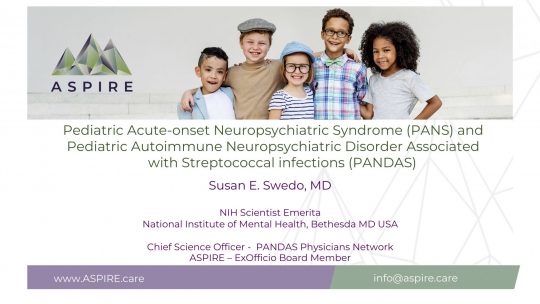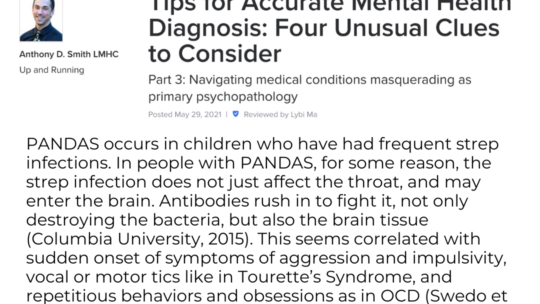
Prior Written Notice
Prior Written Notice (PWN) is a written explanation of why the district proposes or rejects a change to a student’s IEP. This includes if you want to challenge the district’s...

Prior Written Notice (PWN) is a written explanation of why the district proposes or rejects a change to a student’s IEP. This includes if you want to challenge the district’s...

Susan Swedo, MD and Gabriella True of ASPIRE - Alliance to Solve PANS & Immune-Related Encephalopathies provide a brief overview of PANS...
Ng QX, Lim YL, Loke W, Yeo WS, Chee KT. Obsessive-Compulsive Disorders and Functional Urinary Disorders: A Fortuitous Association? Behavioral Sciences. 2021; 11(6):89. DOI: 10.3390/bs11060089

PANS PANDAS is medically complex. In order to have an informed discussion with your providers, it can be helpful to track symptoms, exposures to triggers, and medications. This Medication Log...

Keep a copy for yourself. Hand deliver and ask for a date stamp or send with Return Receipt to establish timeline or email as an attachment. (Parent/Guardian Name) (Home Address)...
Print and take to your next appointment! You do not want to leave an appointment with more questions than you had going in. You need to clarify the lab results,...

Track and Rate PANS PANDAS Symptoms Tracking symptoms is a critical part of making a clinical diagnosis and forming treatment plans. ASPIRE has assembled the most used symptom tracking and...

So, I noticed Sam posting about Tourette Syndrome (TS), Obsessive Compulsive Disorder (OCD), and PANS PANDAS (PP) on Instagram a few months ago. And my first thought was – oooh...

Giggle Magazine article on PANDAS. Page 23-24 of their June/July 2021 issue is available online....

PANS/PANDAS is not the same as traditional OCD or a tic disorder; the onset and concurrent symptoms and, in some cases, the severity of the OCD set these disorders apart....

Part 3: Navigating medical conditions masquerading as primary psychopathology Anthony D. Smith LMHC, Posted May 29, 2021 “Perhaps some of the most interesting cases of medical conditions...